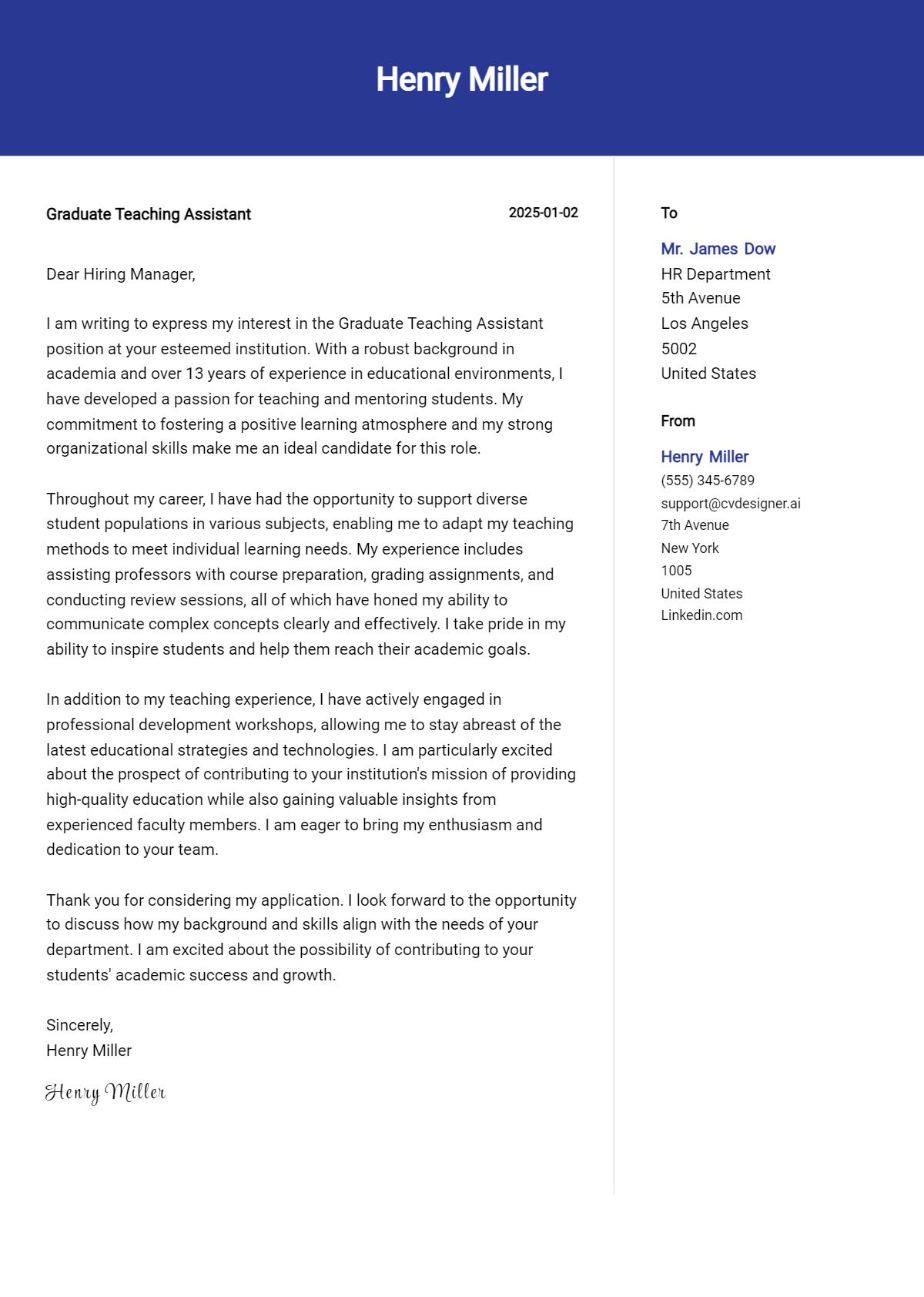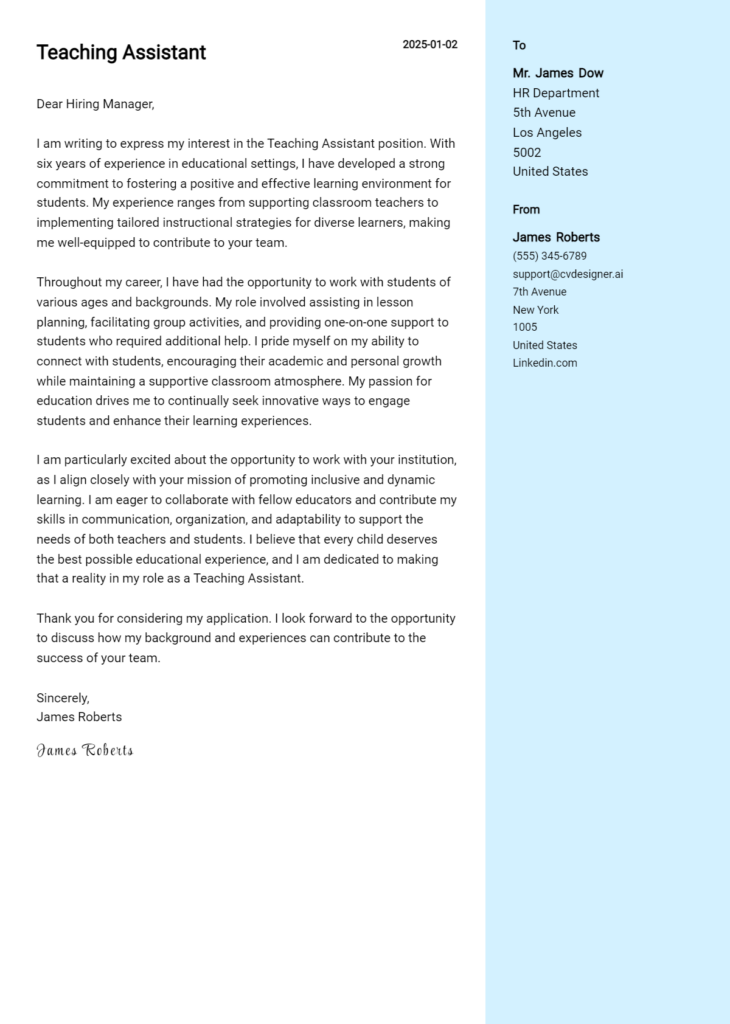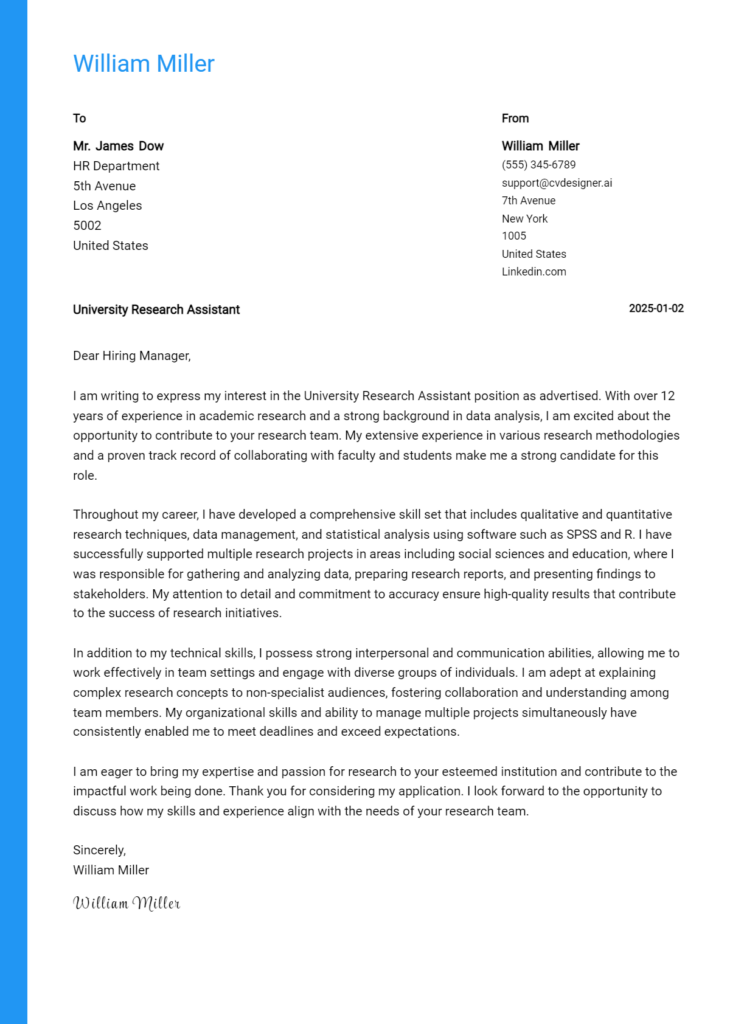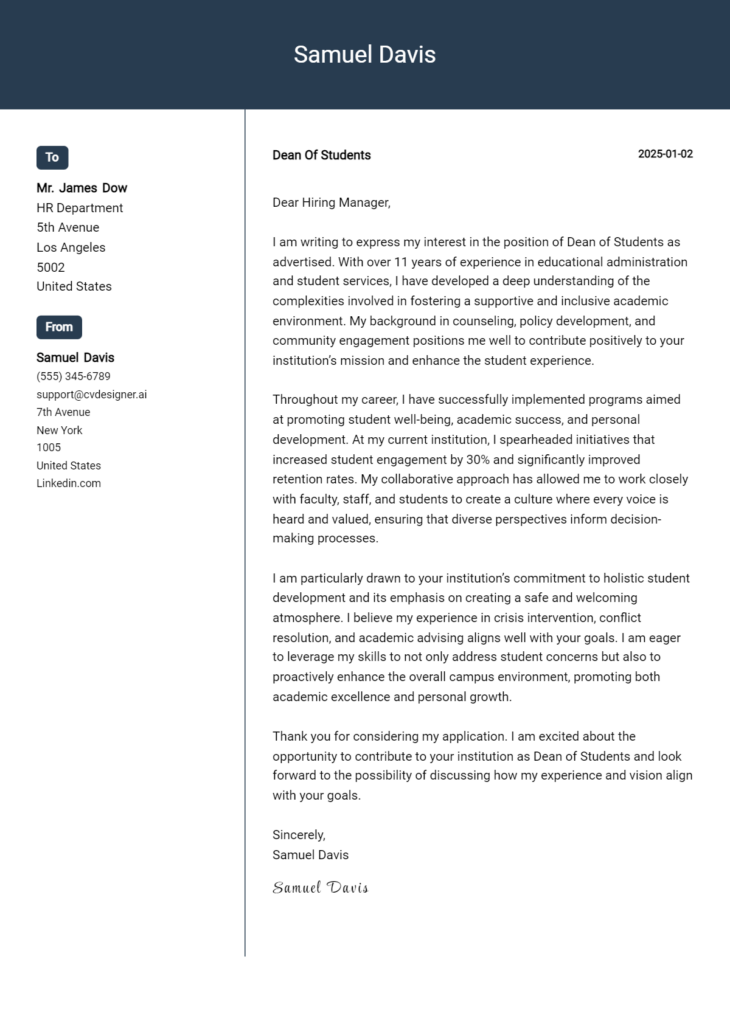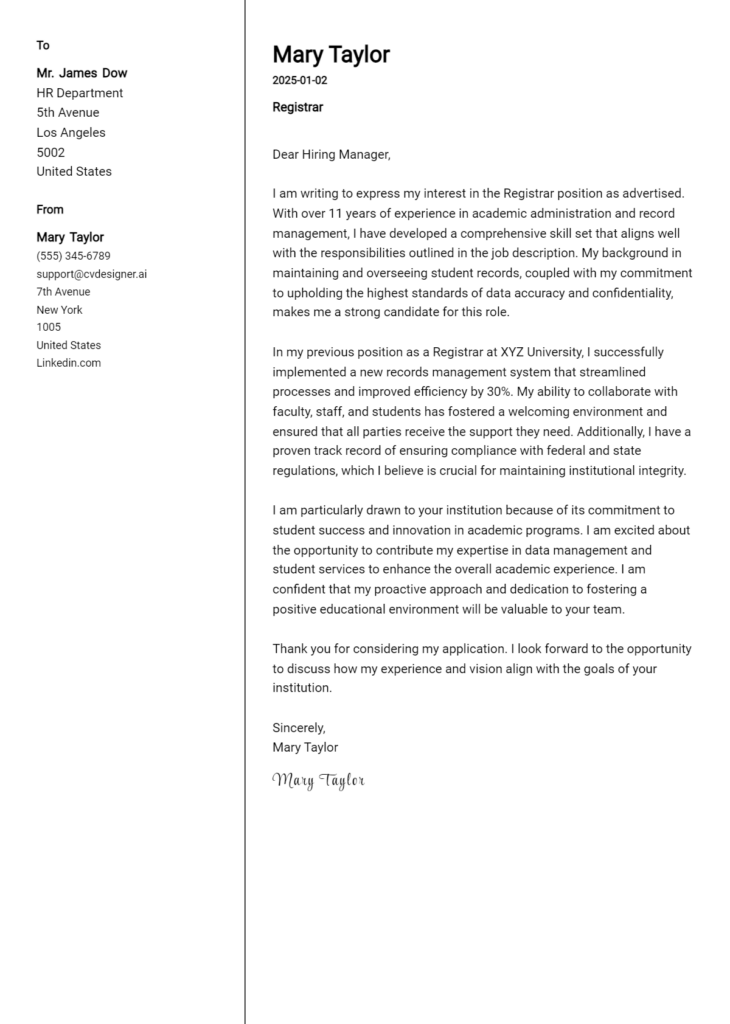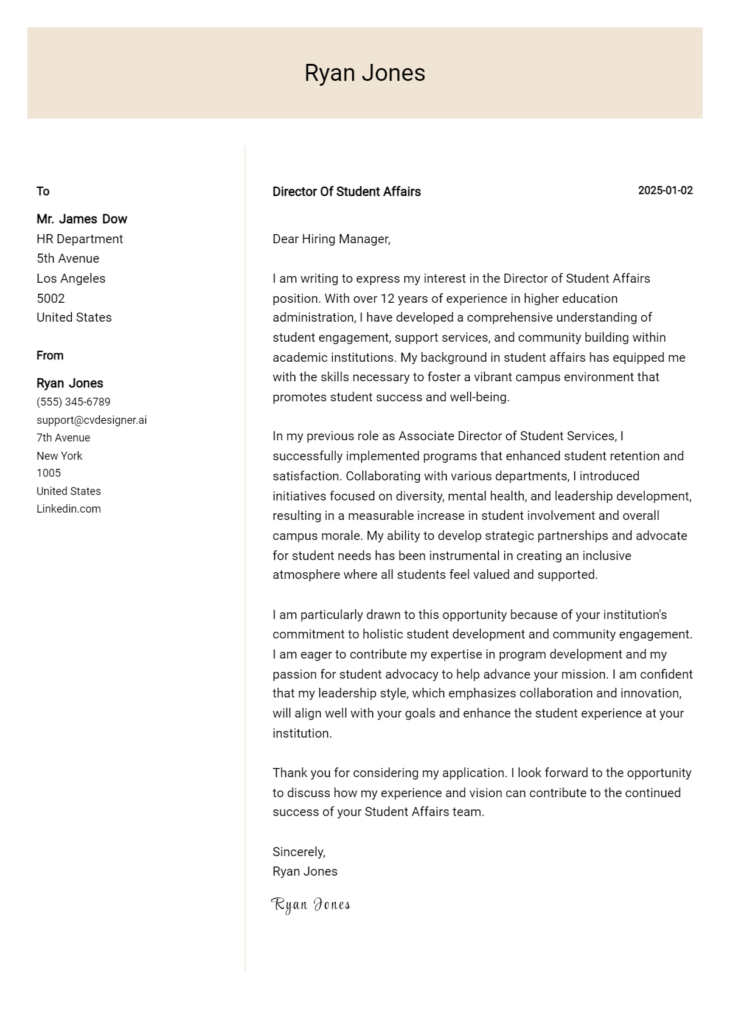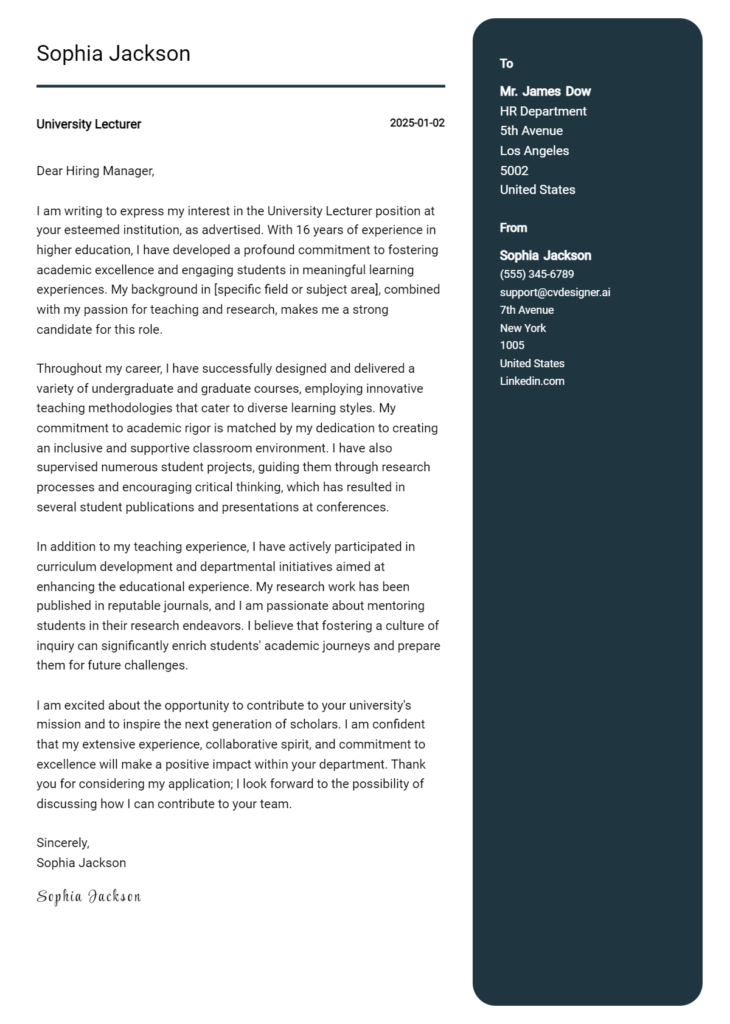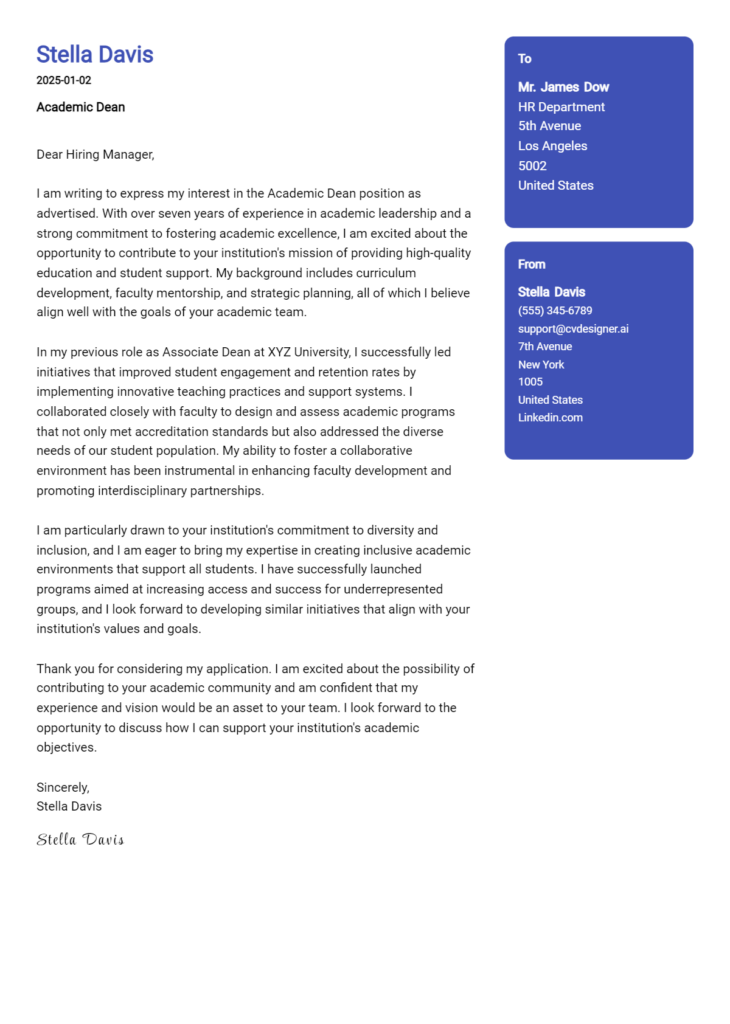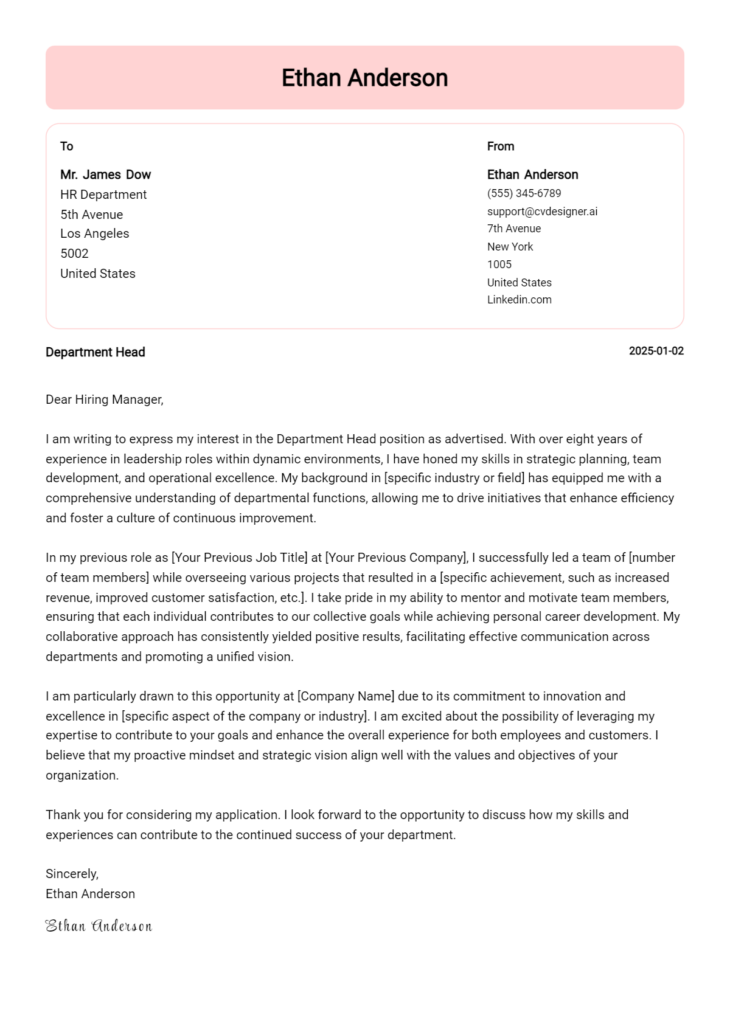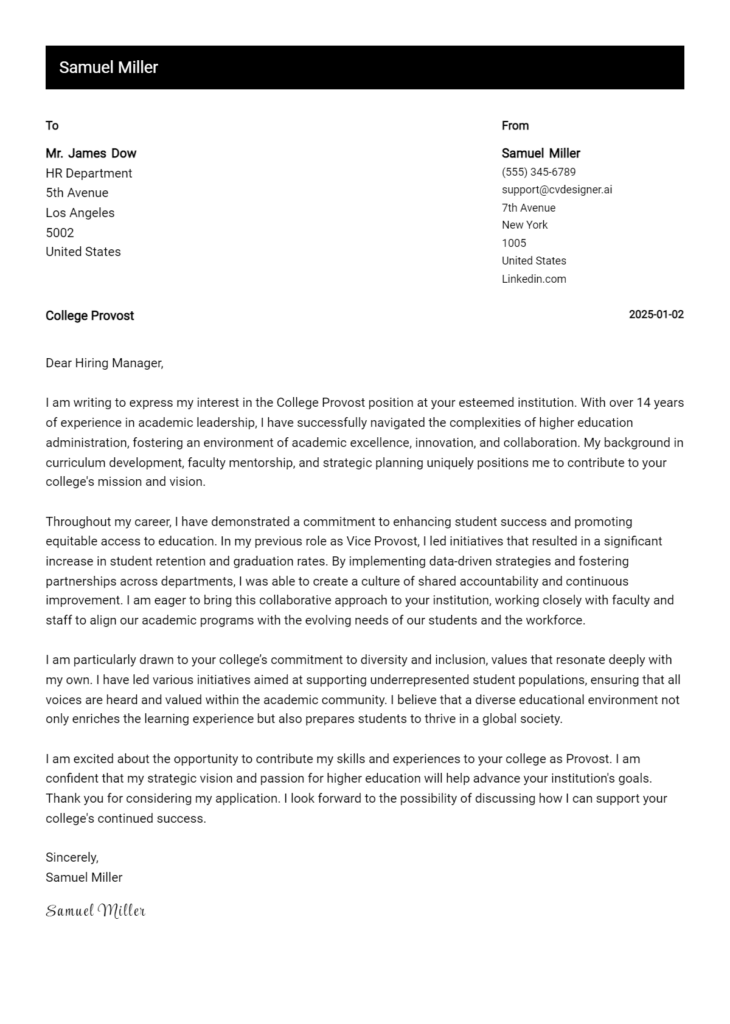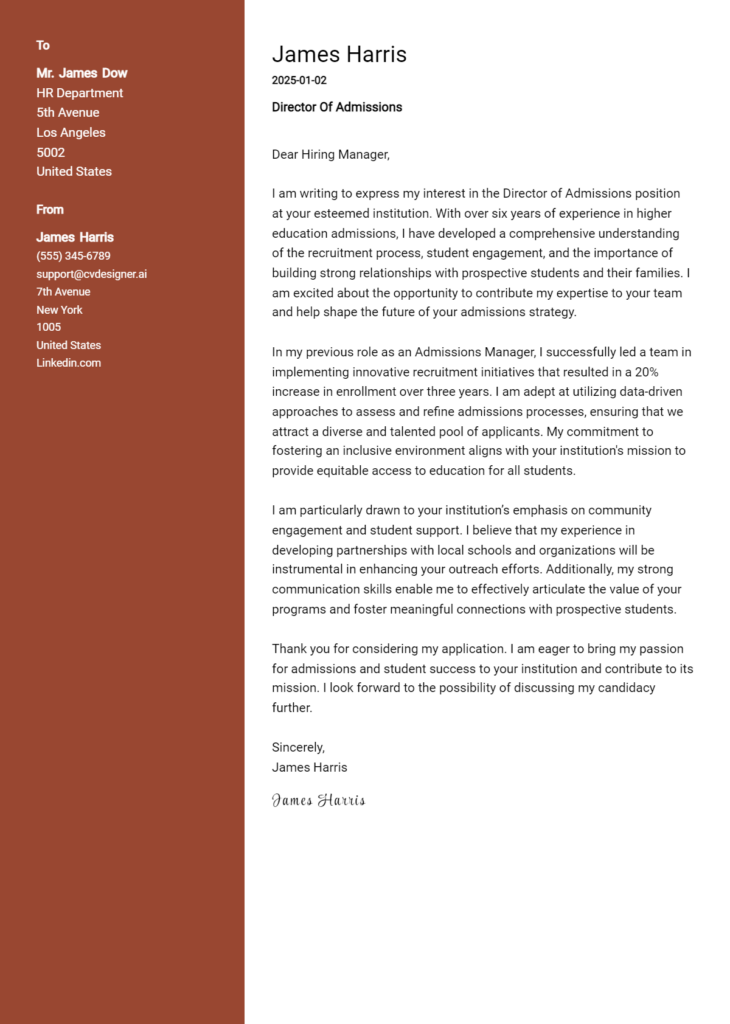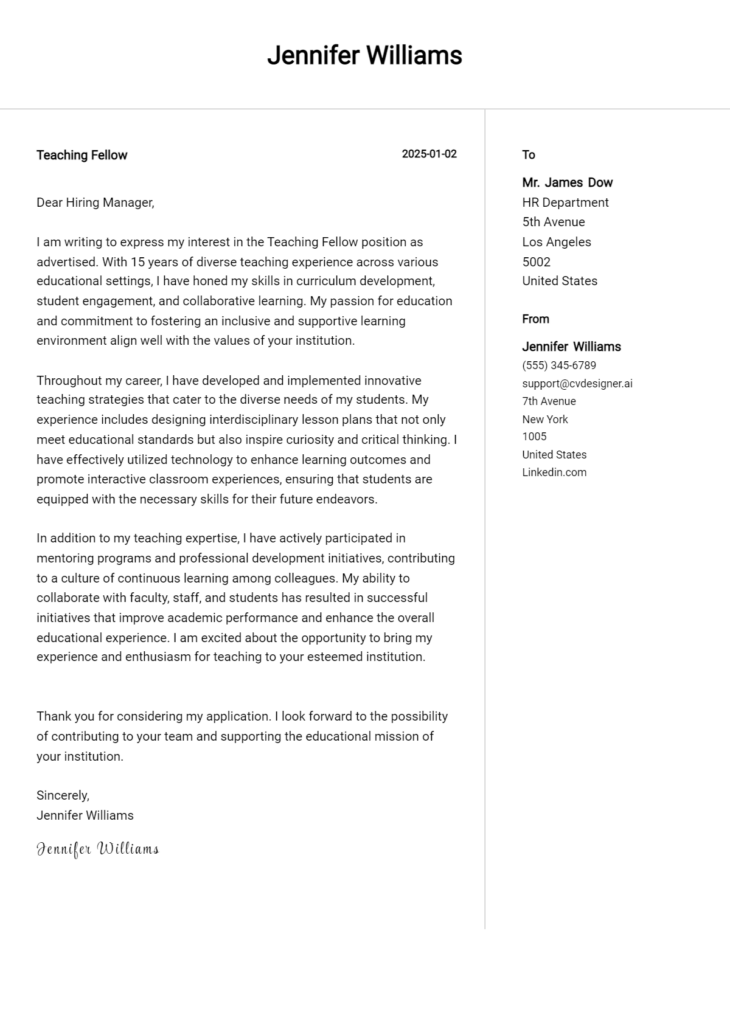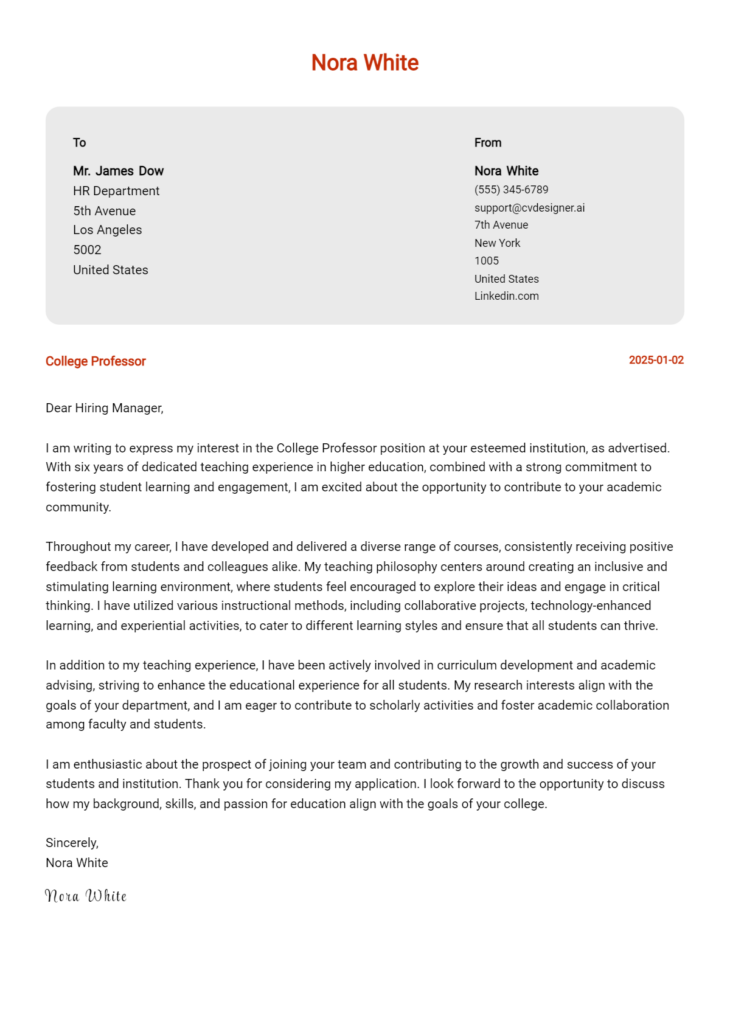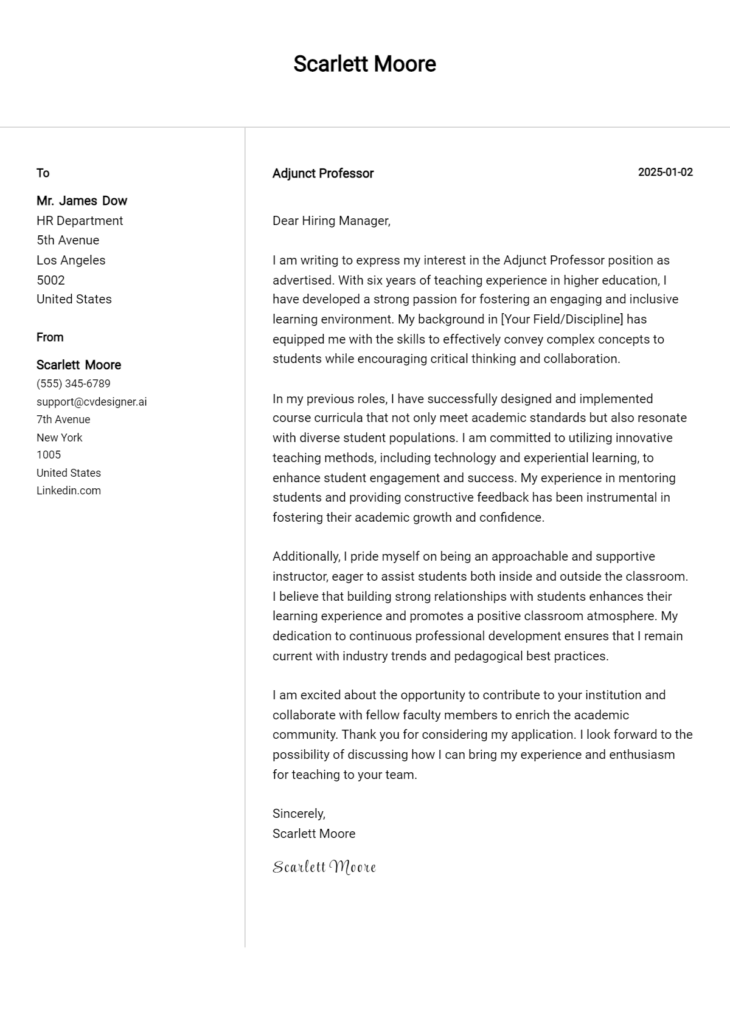Graduate Teaching Assistant Cover Letter Examples
Explore additional Graduate Teaching Assistant cover letter samples and guides and see what works for your level of experience or role.
How to Format a Graduate Teaching Assistant Cover Letter?
Crafting a well-structured cover letter is essential for aspiring Graduate Teaching Assistants, as it serves as your first opportunity to make a lasting impression on the hiring committee. The format of your cover letter not only showcases your qualifications but also reflects your organizational skills and professionalism—both vital attributes in an academic environment. A well-organized document captures the reader's attention and clearly communicates your passion for teaching and your commitment to student development.
In this guide, we'll explore the key components of an effective Graduate Teaching Assistant cover letter, including:
- Cover Letter Header
- Cover Letter Greeting
- Cover Letter Introduction
- Cover Letter Body
- Cover Letter Closing
Each section plays a crucial role in presenting your strengths and aligning your experience with the needs of the academic department. Let’s dive into each part to help you create a compelling cover letter that stands out in the competitive field of academia.
Importance of the Cover Letter Header for a Graduate Teaching Assistant
The cover letter header is a critical component of any professional correspondence, including applications for a Graduate Teaching Assistant position. This section provides essential information to establish your identity and facilitates easy communication between you and the recipient. A well-structured header should include your contact information, the date, and the recipient's details, all presented in a clear and professional manner. A strong header not only conveys your attention to detail but also sets a positive tone for the rest of your application.
A poorly formatted header, on the other hand, can create confusion and detract from the professionalism of your application. It's important to ensure that your header is organized and easy to read, as this reflects your ability to communicate effectively, a key skill for any teaching assistant.
Strong Example
John Doe 123 Main Street City, State, ZIP johndoe@email.com (123) 456-7890 October 1, 2023 Dr. Jane Smith Department of Education XYZ University 456 College Avenue City, State, ZIP
Weak Example
johndoe@email.com Dr. Smith October 1, 2023
The Importance of the Cover Letter Greeting
The greeting of a cover letter is a critical component that sets the tone for the entire document. It serves as the first impression a hiring manager will have of you, demonstrating your professionalism and attention to detail. By addressing the hiring manager directly, you create a sense of personalization that can distinguish your application from others. Avoiding generic greetings, such as "To Whom It May Concern," is essential; instead, invest time in researching the recipient's name and title if necessary. This small effort can showcase your enthusiasm for the position and your commitment to making a meaningful connection.
Strong Greeting Example
Dear Dr. Smith,
Weak Greeting Example
To Whom It May Concern,
The Importance of a Well-Crafted Cover Letter Introduction for a Graduate Teaching Assistant
A well-crafted cover letter introduction is crucial for a Graduate Teaching Assistant position as it serves as the first impression to the hiring manager. This opening paragraph should not only capture their attention but also convey the candidate's enthusiasm for the role and highlight key skills or achievements that make them a strong fit. A strong introduction sets the tone for the rest of the cover letter, making it more likely that the reader will continue to engage with the content. Conversely, a weak introduction can lead to disinterest and may result in the candidate's application being overlooked.
Strong Example
Dear [Hiring Manager's Name], I am excited to apply for the Graduate Teaching Assistant position at [University Name], where I can leverage my strong academic background in [Your Field of Study] and my passion for fostering student learning. With a proven track record of [specific achievement or skill, e.g., tutoring students, leading study groups], I am eager to contribute to the vibrant academic community at [University Name] while further developing my teaching skills.
Weak Example
To Whom It May Concern, I am writing to apply for the Graduate Teaching Assistant job. I think I would be good for this position because I have taken many classes and have some experience with students. I hope you consider my application.
Purpose of the Cover Letter Body for a Graduate Teaching Assistant
The body of a cover letter for a Graduate Teaching Assistant serves as a critical platform for candidates to articulate their qualifications, experiences, and the unique value they bring to the educational institution. It allows candidates to go beyond their resume, providing context to their skills and showcasing specific projects or accomplishments that demonstrate their capability to support faculty and enhance student learning. By effectively communicating relevant experiences—such as leading study sessions, developing educational materials, or conducting research—candidates can illustrate their readiness for the role and their commitment to fostering an engaging academic environment.
Strong Example
Dear [Hiring Manager's Name], I am excited to apply for the Graduate Teaching Assistant position in the Department of Psychology. During my graduate studies, I successfully led a study group for an introductory psychology course, which resulted in a 20% increase in average grades among participants. Additionally, I collaborated with a faculty member on a research project examining the effects of social media on adolescent mental health, which was presented at the National Psychology Conference. These experiences have honed my ability to communicate complex concepts clearly and engage students in meaningful discussions, making me a strong candidate for this role. Sincerely, [Your Name]
Weak Example
Dear [Hiring Manager's Name], I am writing to apply for the Graduate Teaching Assistant position. I have taken several classes in my field and I believe I have the necessary skills. I have also worked with students in the past, which I think is good experience. I hope to help students learn and succeed. Best, [Your Name]
Importance of the Cover Letter Closing for a Graduate Teaching Assistant
The closing paragraph of a cover letter is crucial as it summarizes your qualifications, reiterates your enthusiasm for the position, and encourages further engagement, such as reviewing your resume or scheduling an interview. A strong closing leaves a lasting impression and showcases your professionalism, while a weak closing may fail to capture the reader's attention or provide a clear call to action. Here are examples of both:
Strong Example
Thank you for considering my application for the Graduate Teaching Assistant position. I am excited about the opportunity to contribute to your department and support students in their academic journey. With my background in educational psychology and hands-on tutoring experience, I am confident in my ability to make a positive impact. I look forward to the possibility of discussing my application further and am available at your convenience for an interview. Please find my resume attached for your review.
Weak Example
I hope you look at my resume. I think I could be a good fit for the assistant job. Let me know if you want to talk more.
These tips will help candidates craft an effective cover letter for a Graduate Teaching Assistant position, showcasing their unique qualifications and experiences. A well-written cover letter can set you apart from other candidates by highlighting your technical skills, problem-solving abilities, knowledge of the Software Development Life Cycle (SDLC), teamwork capabilities, and a passion for continuous learning. By emphasizing these aspects, you can demonstrate your readiness to contribute positively to the academic environment.
Tips for Writing an Effective Cover Letter
Highlight Your Technical Skills
Clearly outline the technical skills relevant to the teaching assistant role. Mention specific programming languages, software tools, or methodologies you are proficient in. Tailoring your skills to align with the course content or the department's needs can make your application more compelling.Demonstrate Problem-Solving Abilities
Use specific examples from your academic or professional experience to illustrate your problem-solving skills. Describe a challenging situation you faced, the approach you took to resolve it, and the outcome. This will show your ability to think critically and adaptively, traits essential for a teaching assistant.Showcase Your Knowledge of SDLC
If applicable, mention your understanding of the Software Development Life Cycle. Explain how this knowledge enhances your ability to assist students with projects and coursework. This can be particularly relevant if you are applying for a position in a computer science or related program.Emphasize Teamwork and Collaboration
Teaching assistants often work closely with professors and students. Highlight your experiences in team settings, whether in group projects, research teams, or extracurricular activities. Discuss how you contributed to these teams and what you learned about collaboration and communication.Express Your Passion for Continuous Learning
Academic environments thrive on a culture of learning and growth. Share your enthusiasm for education and your commitment to developing your own skills. Mention any workshops, courses, or professional development opportunities you have pursued, as well as how you plan to contribute to the learning community.
By integrating these elements into your cover letter, you can effectively communicate your suitability for the Graduate Teaching Assistant role. For additional resources, consider using cover letter templates or a cover letter builder to streamline the writing process and ensure a professional presentation.
Common Mistakes to Avoid in a Graduate Teaching Assistant Cover Letter
Crafting a compelling cover letter is crucial for standing out as a Graduate Teaching Assistant candidate. Avoiding common mistakes can significantly enhance your chances of success. Here are some frequent pitfalls and tips to steer clear of them:
Generic Content: Many applicants use a one-size-fits-all approach. Tailor your cover letter to the specific position by mentioning the institution and how your skills align with their needs.
Lack of Enthusiasm: Failing to convey genuine interest can be detrimental. Use passionate language about teaching and learning, and explain why you are excited about the role.
Overly Formal Language: While professionalism is important, overly stiff language can make you seem unapproachable. Strive for a balance of professionalism and warmth.
Ignoring the Job Description: Not referencing the specific qualifications listed in the job description can make your application seem unfocused. Highlight relevant experiences and skills that match their requirements.
Spelling and Grammar Errors: Simple mistakes can undermine your credibility. Proofread your letter multiple times and consider asking a friend for a second opinion.
Neglecting Formatting: Poorly formatted cover letters can be difficult to read. Follow a clear cover letter format to ensure your document is visually appealing and easy to navigate.
Failing to Include Contact Information: Omitting your contact details can hinder communication. Always include your email address and phone number at the top of the letter.
By avoiding these common mistakes and following best practices, you can create an effective cover letter that showcases your qualifications and enthusiasm for the Graduate Teaching Assistant role. For more guidance, check out these cover letter examples.
Cover Letter FAQs for Graduate Teaching Assistant
What should I include in my cover letter for a Graduate Teaching Assistant position?
In your cover letter, include your educational background, relevant teaching or tutoring experience, and any specific skills that make you a strong candidate. Start with a professional introduction, stating the position you're applying for and where you found the listing. Highlight your academic achievements and any teaching methodologies you are familiar with. Mention relevant coursework and projects that demonstrate your expertise in the subject area. Finally, express your enthusiasm for the role and your desire to contribute to the academic community, showing how your goals align with the institution's mission.
How can I demonstrate my teaching skills in the cover letter?
To effectively demonstrate your teaching skills, provide specific examples of your past experiences. Discuss any previous teaching assistant roles, tutoring, or mentoring experiences where you successfully engaged students or facilitated learning. Highlight techniques you've used to encourage participation, such as interactive discussions or hands-on projects. If applicable, mention any teaching certifications or training you've completed. Additionally, you can reference feedback from students or faculty that illustrates your effectiveness as a teacher. This concrete evidence will help convince the hiring committee of your capabilities.
Should I tailor my cover letter for each application?
Yes, tailoring your cover letter for each application is crucial. Each institution has unique values, teaching styles, and departmental needs, so customizing your letter will show that you are genuinely interested in the position. Research the specific program and faculty members to understand their teaching approaches and areas of focus. Align your experiences and skills with their expectations, and mention how you can contribute to their goals. By demonstrating that you've invested time to understand the program, you increase your chances of standing out as a candidate who fits well with their team.
How long should my cover letter be for a Graduate Teaching Assistant position?
Your cover letter should ideally be one page long, typically around three to four paragraphs. Aim for a concise yet comprehensive approach that maintains the reader's attention. Use clear and straightforward language to convey your qualifications without overwhelming the reader with too much information. Each paragraph should have a distinct purpose: the introduction, a summary of your qualifications, specific examples of your teaching experience, and a closing statement. Keeping your cover letter focused and to the point will make it easier for hiring committees to quickly assess your fit for the Graduate Teaching Assistant role.
Build your Cover Letter in minutes
Use an AI-powered cover letter builder and have your letter done in 5 minutes. Just select your template and our software will guide you through the process.

